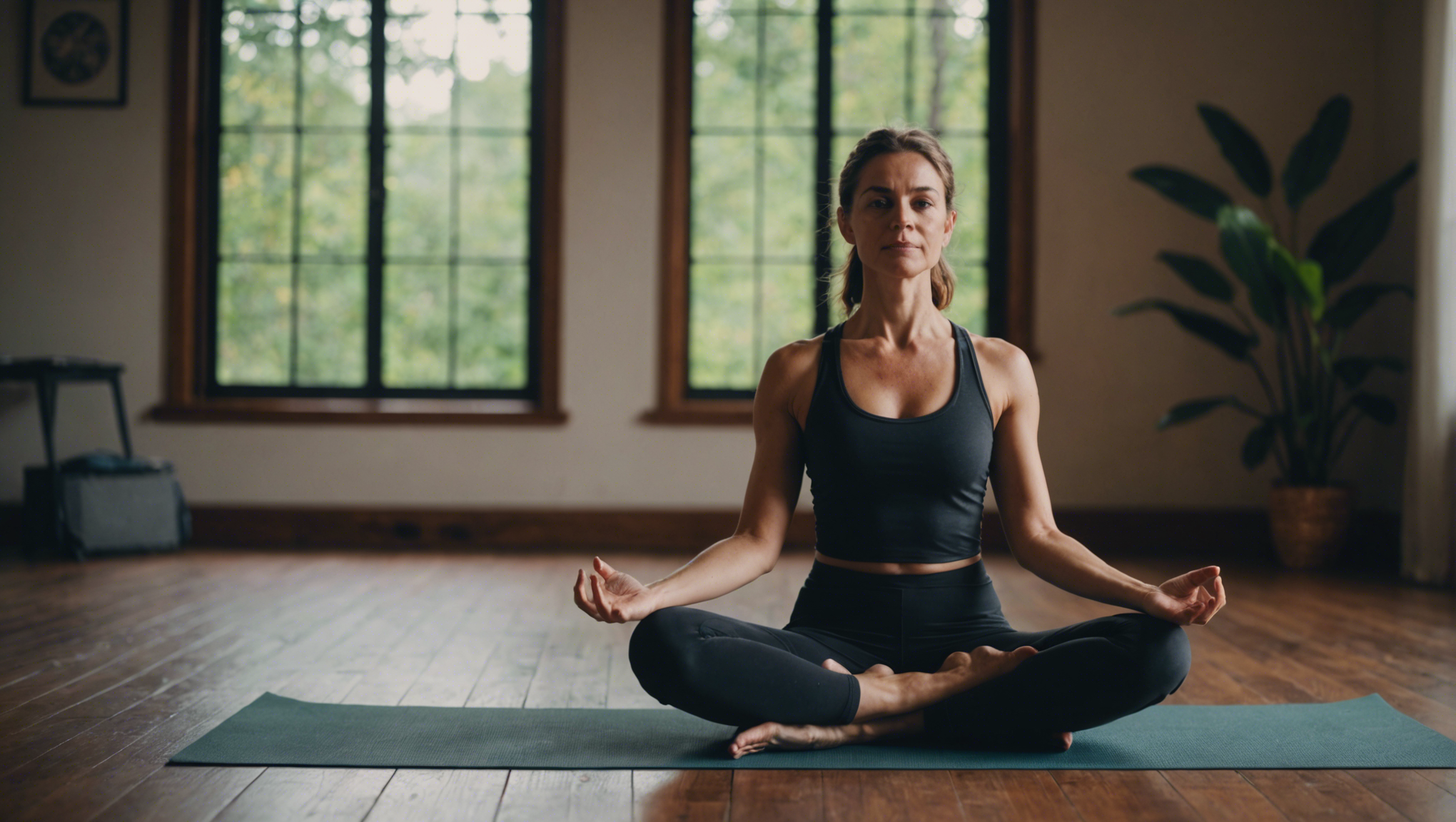Transformative Impact: How Yoga Changed My Life
The Transformative Journey: My Personal Experience with Yoga
Discovering a New Horizon Through Yoga
Yoga, an ancient practice with roots stretching back thousands of years, is often lauded for its physical benefits. However, its most profound impact perhaps lies in its ability to transform lives, a truth I came to discover on a deeply personal level. This journey of transformation through yoga is not just about achieving physical flexibility or strength but about finding mental clarity, emotional balance, and a deeper connection with one’s inner self.
The Genesis of Change
My encounter with yoga began at a point in my life marked by stress, imbalance, and a pervasive sense of discontent. Like many, I turned to yoga with the intention of improving my physical wellbeing, unaware of the profound journey that awaited me. This practice, initially a form of exercise, soon revealed itself as a pathway to deeper self-discovery and healing.
Embarking on a Path of Mindfulness
One of the first transformations I experienced was the cultivation of mindfulness. Yoga taught me to be present, to anchor myself in the here and now, and to observe my thoughts and feelings without judgment. This shift towards mindfulness extended beyond the yoga mat, influencing my interactions, my work, and my approach to life’s challenges. It was as if yoga had given me a new lens through which to view the world, one that fostered peace, clarity, and compassion.
The Unveiling of Emotional Resilience
As my yoga practice deepened, so did my emotional resilience. Yoga, with its emphasis on breath control and mindfulness, equipped me with the tools to navigate life’s ups and downs with a newfound serenity. I learned to approach my feelings with curiosity rather than resistance, allowing me to process and move through emotions with greater ease. This emotional resilience has been a cornerstone in my journey toward wellness, enabling me to cultivate a stable and responsive rather than reactive state of mind.
Reconnecting with the Spiritual Self
Perhaps the most transformative aspect of my yoga journey has been the reconnection with my spiritual self. Yoga, in its essence, is a spiritual practice, offering a pathway to inner peace and enlightenment. Through meditation, mantras, and the physical postures themselves, I began to explore aspects of my spirituality that had been neglected. This reconnection brought a sense of wholeness, purpose, and joy that had been missing from my life.
The Physical Transformation
While the mental and emotional benefits of yoga are profound, the physical transformation cannot be overlooked. Yoga has not only improved my flexibility and strength but has also encouraged a greater awareness of my body. This awareness has led to healthier lifestyle choices, a better understanding of my body’s needs, and a more harmonious relationship with physical exercise as a whole.
A Journey of Continuous Growth
Yoga is a lifelong journey, one that does not end at achieving a particular pose or mastering a breathing technique. It is a continuous path of growth, learning, and transformation. Each day on the mat is an opportunity to explore, to challenge oneself, and to connect with a deeper sense of purpose and peace.
The transformative impact of yoga on my life has been profound and multifaceted. It provided me not only with the tools to navigate the complexities of life with grace and resilience but also ushered in a new era of growth, self-discovery, and spiritual awakening. Yoga, in essence, is more than just a practice; it is a way of life, a guide to living with intention, balance, and harmony.
Physical Wellness: Beyond Flexibility and Strength
When it comes to nurturing our bodies, the journey transcends mere strength gathering and flexibility enhancement. The pursuit of physical wellness is a multifaceted endeavor, deeply interwoven with our mental and emotional states. This exploration into a holistic approach to health casts a new light on well-being, urging us to consider how our physical practices impact our overall life quality.
Embracing a Holistic Approach to Well-being
The conventional view of physical wellness often emphasizes repetitive strength training and flexibility exercises. While these elements are undoubtedly crucial, they represent only a fraction of the equation. A holistic approach encourages us to look beyond these physical attributes, considering how nutrition, mental health, sleep, and stress management play equally pivotal roles. This comprehensive perspective ensures that every facet of our health is nurtured, balanced, and harmonized.
Nutrition: The Foundation of Physical Health
A well-balanced diet is the cornerstone of any wellness regimen. The fuel we provide our bodies directly impacts our energy levels, recovery rates, and overall physical condition. By consuming a diverse array of nutrient-rich foods, we lay the groundwork for a body that is not just strong and flexible but also resilient and vibrant. The integration of diverse nutrients supports our body’s intricate systems, facilitating optimal performance and warding off illness.
Mental Wellness: A Key Player in Physical Health
The interconnectedness of mental and physical health cannot be overstated. Stress, anxiety, and depression can lead to physical ailments just as physical health issues can affect our mental well-being. Engaging in practices that promote mental wellness, such as mindfulness, meditation, or even leisurely walks in nature, can significantly enhance our physical health. These activities reduce stress levels, improve sleep quality, and contribute to a more balanced and energetic physique.
The Role of Quality Sleep in Physical Health
Sleep is the unsung hero of physical wellness. Quality rest is essential for muscle recovery, hormonal balance, and overall physical health. It is during sleep that our bodies repair, build, and strengthen. Proper sleep hygiene—consisting of a consistent sleep schedule, a relaxing pre-sleep routine, and a comfortable sleep environment—can dramatically improve physical performance and well-being.
Managing Stress for Enhanced Physical Wellness
Stress is an inevitable part of life, but its management is critical for maintaining physical health. Chronic stress can lead to a multitude of health issues, including hypertension, weakened immune function, and increased risk of chronic diseases. Techniques such as deep-breathing exercises, yoga, and regular physical activity can serve as effective stress relievers, thereby bolstering our physical health.
The Power of Consistency and Moderation
In the quest for physical wellness, consistency, and moderation emerge as guiding principles. Extremes—whether in diet, exercise, or stress management—are unsustainable and potentially harmful. By fostering habits that are consistent and moderate, we can achieve a state of balanced health that supports our overall quality of life.
Reflections on the Journey to Holistic Wellness
As we traverse the path toward enhanced physical wellness, it is essential to remember that this journey is deeply personal and evolving. What works for one individual may not suit another. It is through trial, reflection, and adaptation that we can discover the practices and routines that resonate with our unique needs and preferences.
Embarking on this comprehensive approach to health requires patience, commitment, and self-compassion. By embracing the interconnectedness of physical, mental, and emotional wellness, we open ourselves to a life of balance, energy, and fulfillment. This holistic perspective not only enriches our existence but also empowers us to navigate the complexities of life with resilience and grace.
Achieving physical wellness extends far beyond the realms of strength and flexibility. It encompasses a broad spectrum of practices that nourish our bodies, minds, and spirits. Through a balanced and mindful approach to health, we can unlock our full potential, experiencing life’s richness in its entirety.
Mental Clarity and Emotional Growth Through Yoga Practice
The ancient practice of yoga, far beyond its physical postures and breathwork, offers a transformative journey towards mental clarity and emotional growth. Amidst the cacophony of our daily lives, finding solace in yoga can be the gateway to a more serene and mindful existence. This article delves into how yoga serves as a powerful tool for nurturing mental and emotional well-being, drawing from scientific evidence, traditional wisdom, and personal experiences.
Discovering Mental Clarity through Yoga
Yoga, with its roots deeply embedded in ancient Indian philosophy, presents a holistic approach to wellness. The practice encompasses not just physical exercises (asanas) but also meditation (dhyana) and breath control (pranayama), which together foster an unparalleled sense of mental clarity. Research has consistently shown that regular yoga practice improves focus, reduces symptoms of anxiety and depression, and enhances cognitive functions.
The mechanism behind yoga’s ability to improve mental clarity lies in its capacity to reduce stress. By lowering cortisol levels, the body’s stress hormone, yoga facilitates a state of calm, allowing the mind to clear and focus to improve. This mental decluttering is crucial in today’s fast-paced world, where constant stimulation and multitasking often leave our minds fatigued and overloaded.
Emotional Growth through the Path of Yoga
Yoga offers a profound path to emotional growth, teaching us the art of self-reflection and mindfulness. By turning our focus inward, we begin to cultivate a deep sense of self-awareness. This introspective journey allows us to confront and release deeply rooted emotions, paving the way for healing and growth.
The practice of yoga encourages the development of patience, resilience, and compassion towards oneself and others. As we learn to accept our limitations and celebrate our progress on the mat, these attitudes naturally seep into our daily lives. Consequently, yoga practitioners often report enhanced emotional resilience and an increased capacity for empathy and understanding.
The Science Behind Yoga’s Emotional Benefits
Scientific studies underpin the emotional benefits attributed to yoga, revealing how it can significantly impact our neurological and physiological responses to stress. For instance, yoga has been found to increase the levels of gamma-aminobutyric acid (GABA) in the brain, a neurotransmitter that plays a key role in regulating mood. It suggests that yoga not only helps in managing stress and anxiety but also actively contributes to a more positive emotional state.
Comparatively, yoga practices have been linked to improved heart rate variability (HRV), an indicator of the body’s ability to handle stress. High HRV is associated with better emotional regulation and resilience. Thus, the regular practice of yoga can lead to more stable emotional responses to life’s ups and downs.
Integrating Yoga Into Your Life for Mental and Emotional Well-being
Embarking on a yoga journey requires no specific level of fitness or spirituality; it simply asks for an open heart and mind. To reap the benefits of yoga for mental clarity and emotional growth, consistency is key. Even a few minutes of daily practice can make a significant difference over time.
It’s advantageous to explore different styles of yoga and find the one that resonates most with you. Whether it’s the physically demanding Ashtanga, the gentle flow of Vinyasa, or the meditative stillness of Yin, each style offers unique benefits to your mental and emotional health.
Testimonials of Transformation
Real-life stories of transformation through yoga abound. Individuals from all walks of life share how yoga has helped them overcome mental health challenges, foster emotional healing, and find a deeper sense of purpose and connection. These testimonials not only inspire but also underscore the universality of yoga’s benefits, cutting across cultural and demographic lines.
Ultimately, the journey of yoga is a deeply personal one, offering each practitioner a unique path to mental clarity and emotional growth. As we continue to navigate through the complexities of modern life, the ancient wisdom of yoga remains a beacon of light, guiding us towards a more mindful, peaceful, and fulfilling existence.
Yoga as a Catalyst for Lifestyle Change
Embarking on a journey of self-improvement and lifestyle change is often met with challenges and skepticism. Yet, an ancient practice has proven time and again to be a transformative force in countless lives: yoga. Not merely a physical exercise, yoga extends its benefits into the realms of mental health, spiritual growth, and overall life satisfaction. This profound impact goes beyond the mat, influencing dietary habits, sleep patterns, relationships, and even career paths.
The Holistic Nature of Yoga
Yoga presents a multi-faceted approach to health and well-being through its combination of physical postures, breathing techniques, and meditation practices. This holistic nature addresses not just the body, but also the mind and spirit. Through regular practice, individuals frequently report a heightened sense of awareness, leading to more mindful eating, improved self-discipline, and a deeper connection with their inner selves. This elevates yoga from a mere workout routine to a comprehensive lifestyle guide.
Physical Benefits and Beyond
The physical advantages of yoga are well-documented, including increased flexibility, stronger muscles, and better posture. However, the benefits extend far beyond these visible markers. Yoga practitioners often experience reduced stress levels, thanks to the calming effect of breathing exercises and meditation. This can lead to a decrease in anxiety, making space for a more positive mental state and enhanced emotional resilience. Such changes lay the foundation for a more balanced and fulfilling life.
Diet and Nutrition: A Mindful Shift
One of the most significant lifestyle changes many yoga practitioners encounter is a transformation in their approach to diet and nutrition. As individuals become more attuned to their bodies and minds, the desire for wholesome, nourishing foods naturally follows. This isn’t about adhering to strict diet plans but rather cultivating an intuitive eating philosophy. The mindfulness learned on the mat translates to a more conscious relationship with food, often steering choices toward options that support overall well-being.
Influencing Sleep and Rest
Quality sleep is an essential component of a healthy lifestyle, and yoga can play a pivotal role in achieving it. The relaxation techniques practiced in yoga, such as controlled breathing and meditation, aid in calming the nervous system. This preparatory process can lead to deeper, more restorative sleep. Furthermore, the physical activity involved helps regulate the body’s natural sleep-wake cycles, promoting consistent, restful nights.
Improving Relationships and Social Connections
Beyond the individual, yoga’s influence extends into interpersonal relationships. The principles of empathy, compassion, and patience, reinforced through yoga’s philosophical teachings, can profoundly impact how individuals interact with others. By fostering a greater understanding of oneself, yoga empowers practitioners to engage in healthier, more meaningful relationships. This supportive social environment further cements the lifestyle changes initiated by personal insights and growth.
Career Trajectory and Personal Development
Remarkably, the discipline and focus garnered through consistent yoga practice can transcend into professional life. Individuals often discover enhanced clarity and concentration, valuable traits in any career. Furthermore, the courage and resilience developed through navigating challenging poses can inspire similar fortitude in facing workplace obstacles. It’s not uncommon for yoga practitioners to reevaluate their professional choices, aligning them more closely with their values and passions.
Yoga: A Journey of Continuous Growth
Yoga is more than an exercise; it’s a catalyst for profound lifestyle change. The journey is, of course, highly individual, with the effects manifesting differently for everyone. Yet, the overarching theme is clear: yoga encourages a lifestyle that prioritizes health, awareness, and personal growth. Through the mind-body connection, it lays the foundation for lasting transformation, impacting not just the practitioner but also the world around them. This comprehensive approach to well-being underscores the enduring relevance and transformative power of yoga in modern lives.
Building a Supportive Community through Yoga
The Power of Collective Practice
In an era where isolation has become more prevalent, finding genuine community spaces is more vital than ever. Among such spaces, yoga stands out not just as a practice for individual well-being but as a potent medium for building supportive communities. This ancient discipline, known for its harmonious blend of physical postures, breathing exercises, and meditation, serves as a unique confluence where personal growth and communal support flourish in unison.
The Essence of Yoga in Fostering Connections
At the heart of yoga is the understanding that we are interconnected, transcending the boundaries set by our individual selves. When practiced in a group, yoga amplifies this sense of connection, creating an environment where each individual’s presence is both acknowledged and valued. This shared experience fosters a bond that goes beyond the physical dimensions of the practice, touching the lives of participants in profound and lasting ways.
The Role of Yoga Studios and Community Centers
Yoga studios and community centers play a crucial role in this transformative journey. These spaces are not just venues for physical practice but sanctuaries for people to come together, share experiences, and support each other’s growth. Through regular classes, workshops, and social events, they offer a platform for community members to interact, further cementing the bonds formed on the mat.
Nurturing a Supportive Environment Through Guided Practices
Guided practices are instrumental in nurturing a supportive environment within the yoga community. Skilled instructors play a pivotal role here, facilitating sessions in a way that encourages participants to explore their limitations while being mindful and supportive of others. This collective exploration and mutual respect pave the way for a more inclusive and supportive community, where members feel safe and empowered to share their journey with others.
Impact on Individual and Collective Well-being
The impact of integrating yoga into daily life extends beyond individual well-being. As individuals become more grounded, mindful, and compassionate through their practice, these qualities echo throughout the community, enhancing collective well-being. A supportive yoga community can significantly reduce feelings of loneliness and disconnectedness, offering a haven for individuals seeking solace and connection in the fast-paced modern world.
Virtual Spaces: Extending the Reach of Yoga Communities
With the advent of digital technology, the concept of yoga communities has transcended physical spaces. Online classes, forums, and social media platforms have become new venues for these communities to flourish. They offer a way for individuals to remain connected with their practice and each other, even when they cannot be physically present. This digital dimension has expanded the reach of yoga communities, making them accessible to a global audience.
Personal Stories of Transformation
The transformative impact of being part of a yoga community is best illustrated through personal stories. Individuals from diverse backgrounds have found support, friendship, and a sense of belonging within these communities, significantly enriching their life experience. These narratives highlight the profound effect that a nurturing community can have on an individual’s path to self-discovery and well-being.
A Path Forward: Cultivating Sustainable Communities through Yoga
As we move forward, the importance of fostering sustainable communities through yoga cannot be overstated. It calls for conscious efforts from every member of the community to nurture an environment of support, respect, and kindness. By doing so, yoga communities can continue to be a source of strength and inspiration for many, guiding individuals towards a more connected and aware state of being.
Building a supportive community through yoga is not just about coming together to practice; it’s about creating a space where every individual can find a sense of belonging, understanding, and mutual respect. In a world that often prioritizes individual achievement over collective well-being, yoga offers a beacon of hope, showing us the way toward more compassionate and connected living.
Conclusion
Reflecting on the transformative journey that began the day I first stepped onto a yoga mat, it’s evident that the impacts of this ancient practice extend far deeper than the physical postures and breathing exercises that typify its outward appearance. Through dedication to yoga, I discovered not just a series of stretches or a workout routine, but a holistic pathway to wellness that continues to revolutionize every aspect of my existence.
This voyage into the heart of yoga revealed to me the profound capabilities of the human body and spirit. Initially drawn to yoga for its physical benefits, I quickly learned that its true power lies in its capacity to enhance flexibility and strength, yes, but also to promote a holistic sense of wellness that ripples across every facet of life. The physical routine became a gateway to understanding the interconnectedness of our mental, emotional, and spiritual health, with each asana and pranayama bringing me closer to a state of balance and harmony.
Engaging with yoga on a regular basis ushered in an unexpected clarity of mind and emotional stability that I had never before experienced. The mental fog that often clouded my thoughts began to lift, replaced by an awareness and mindfulness that enhanced my decision-making, creativity, and emotional responses. Yoga taught me how to navigate life’s ups and downs with grace and resilience, transforming challenges into opportunities for growth and learning. This was not a change that occurred overnight but evolved gradually, with each practice deepening my mental and emotional fortitude.
Beyond personal growth, yoga served as a powerful catalyst for broader lifestyle changes. The principles of mindfulness and balance learned on the mat naturally extended to other areas of life, from dietary choices to the way I interact with others and the environment. It fostered a sense of responsibility towards myself and the world around me, encouraging sustainable living practices and a compassionate, empathetic approach to relationships. Yoga’s holistic embrace does not segregate physical health from mental well-being or environmental consciousness, but instead presents a unified approach to living that is both sustainable and fulfilling.
One of the most unexpected blessings yoga brought into my life was the community it introduced me to. From fellow yoga practitioners to the teachers who guided me through my journey, the sense of belonging and shared purpose I found within the yoga community turned out to be one of its most enriching aspects. These connections, built on mutual support and understanding, have provided a wellspring of inspiration, motivation, and comfort, showing me that yoga is as much about collective wellbeing as it is about individual advancement.
Taken together, these experiences illustrate the profound and multifaceted impact that yoga can have on one’s life. It is more than just a practice or a set of physical exercises; it’s a comprehensive approach to living that teaches balance, resilience, and mindfulness. By fostering physical wellness, mental clarity, emotional growth, and a sense of community, yoga offers a blueprint for a life lived in harmony with oneself and the world.
As this journey continues, the lessons learned from yoga remain a guiding light, illuminating a path towards continual growth and self-discovery. The mat becomes a place of refuge and rejuvenation, a space where transformation occurs not just in body, but in mind and spirit. Whether you are at the beginning of your yoga journey or well along your path, the possibilities for transformation and enlightenment are boundless, with each practice offering the chance to delve deeper into the essence of who we are and who we aspire to be. Through yoga, we not only transform our lives but also engage in the timeless pursuit of wisdom and wellness that unites us all.




